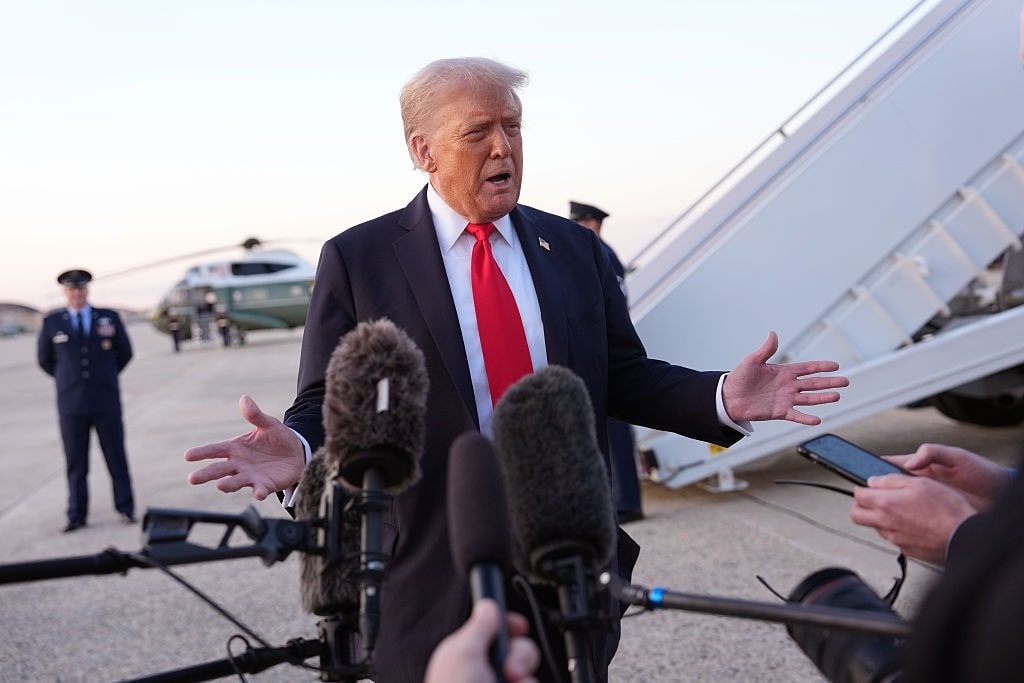
Forget the hype, check the numbers.
President Donald Trump will begin an unprecedented second state visit to the United Kingdom today (Sept. 16). He is the first such president to be officially received a second time by the royal family, and his return is almost certain to cause fractious pearl-clutching in the Fourth Estate on both sides of the Atlantic.
In the run-up to today’s visit, which will continue through Thursday, the British legacy media has been burning the midnight oil to denigrate and castigate Trump. But much like in the United States, the semi-journalistic scribblings that pass for current affairs reporting are way outside the spectrum of public opinion.
Trump, Pageantry, and the Palace
Arriving in Britain this evening, the pomp and circumstance will begin tomorrow with a formal greeting at Windsor Castle by the Prince and Princess of Wales — William and Catherine. Next, the Trumps will meet King Charles and Queen Camilla and will be escorted to the castle through the grounds in a carriage.
The culmination of the day will be a state banquet hosted at Windsor and attended by high-society individuals, business leaders, and high-profile politicians.
Thursday is billed as a “business day,” when Trump will visit Chequers, the country house of Prime Minister Sir Keir Starmer, to talk with him and key cabinet officials. It is here that the real substance of the visit will unfold. All the while, the nation’s left-leaning press will be demanding that Starmer “hold Trump to account” for an unspecified list of grievances. Such posturing belies some surprising data.
Guess Who Wins?
As is largely the case in the United States, the mainstream media in the United Kingdom skews to the left and believes it has the mantle of morality in determining which politicians are “acceptable.” While Sir Keir’s Labour Party remains mostly in the good graces of his Fleet Street allies, the political barometer is reading “stormy.”
Just over a year into government, Labour is now polling well behind Nigel Farage’s Reform Party. In fact, Reform is currently so far ahead (according to a number of surveys) that even if Labour and the Conservative Party combined, they would still fall short. But what does this have to do with Trump?
A City AM poll in August asked respondents to rate their favorability views for a selection of prominent figures. Sir Keir was warmly thought of by just 23%, with 60% having a negative view of the prime minister. Trump beat him by three points, rating a 26% approval and 57% disapproval. Yes, the American president is more popular in the UK than the current PM who just a year ago won election with the largest majority his party had seen in a generation.
Either Trump is doing something very right, or Starmer is doing a whole heap of things very, very wrong. Digging deeper perhaps provides the answer.
Let the Protests Begin
On each of Trump’s visits to the UK since first becoming president in 2017, there have been sizable protests to greet him. It is not dismissive to describe the protesters as “the usual suspects.” They carry placards from such groups as Stand Up to Racism and Socialist Workers, and all marches and protests have been covered by the media as a revolt against Trump and all things Trumpian. A plethora of coverage has graced Britain’s papers, decrying every visit and pronouncement from the White House. And yet, the opposing factions have largely been ignored.
Liberty Nation News provided on-the-ground reporting of various pro-Trump events during his first term — one of the few outlets to do so. Legacy media reporting amounted to almost nil. Indeed, the UK’s media treats Trump with a large smudge of snobbishness.
The late British philosopher Roger Scruton had some fine words that may help explain this attitude. He wrote:
“The disposition, in any conflict, to side with ‘them’ against ‘us,’ and the felt need to denigrate the customs, culture and institutions that are identifiably ‘ours.’ Being the opposite of xenophobia I propose to call this state of mind oikophobia, by which I mean (stretching the Greek a little) the repudiation of inheritance and home.”
This “oikophobia” appears evident on both sides of the pond. It is the driving force of the mainstream press when it belittles and mocks politicians and speakers based on their ideological leanings rather than the words they say. As the left-leaning press may be about to discover – and as the polls certainly suggest – the tide has turned, and public opinion is now firmly the opposite of that which the media believes it to be.
Liberty Nation does not endorse candidates, campaigns, or legislation, and this presentation is no endorsement.
















